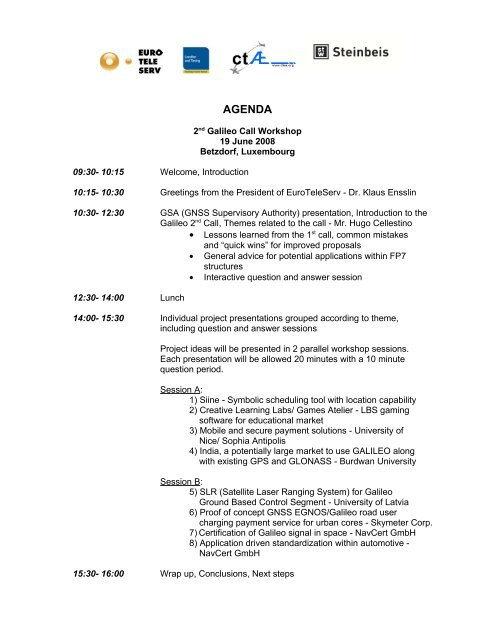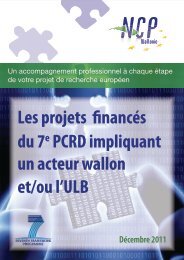AGENDA - NCP-Wallonie
AGENDA - NCP-Wallonie
AGENDA - NCP-Wallonie
Create successful ePaper yourself
Turn your PDF publications into a flip-book with our unique Google optimized e-Paper software.
<strong>AGENDA</strong><br />
2 nd Galileo Call Workshop<br />
19 June 2008<br />
Betzdorf, Luxembourg<br />
09:30- 10:15 Welcome, Introduction<br />
10:15- 10:30 Greetings from the President of EuroTeleServ - Dr. Klaus Ensslin<br />
10:30- 12:30 GSA (GNSS Supervisory Authority) presentation, Introduction to the<br />
Galileo 2 nd Call, Themes related to the call - Mr. Hugo Cellestino<br />
• Lessons learned from the 1 st call, common mistakes<br />
and “quick wins” for improved proposals<br />
• General advice for potential applications within FP7<br />
structures<br />
• Interactive question and answer session<br />
12:30- 14:00 Lunch<br />
14:00- 15:30 Individual project presentations grouped according to theme,<br />
including question and answer sessions<br />
Project ideas will be presented in 2 parallel workshop sessions.<br />
Each presentation will be allowed 20 minutes with a 10 minute<br />
question period.<br />
Session A:<br />
1) Siine - Symbolic scheduling tool with location capability<br />
2) Creative Learning Labs/ Games Atelier - LBS gaming<br />
software for educational market<br />
3) Mobile and secure payment solutions - University of<br />
Nice/ Sophia Antipolis<br />
4) India, a potentially large market to use GALILEO along<br />
with existing GPS and GLONASS - Burdwan University<br />
Session B:<br />
5) SLR (Satellite Laser Ranging System) for Galileo<br />
Ground Based Control Segment - University of Latvia<br />
6) Proof of concept GNSS EGNOS/Galileo road user<br />
charging payment service for urban cores - Skymeter Corp.<br />
7) Certification of Galileo signal in space - NavCert GmbH<br />
8) Application driven standardization within automotive -<br />
NavCert GmbH<br />
15:30- 16:00 Wrap up, Conclusions, Next steps
Session A:<br />
1) Siine - Symbolic scheduling tool with location capability - Ed Maklouf<br />
Siine is a "symbolic scheduler" – a mass-market tool that makes it easier<br />
and faster to compose and process messages about time and<br />
arrangements. Founding partner Ed Maklouf will demonstrate the<br />
invention, suggest how it can lock in with positioning technology, and<br />
present some of the research behind it.<br />
2) Creative Learning Labs/ Games Atelier - Robbert Woltering<br />
Creating Learning Labs is a non-profit educational foundation based in<br />
Amsterdam. One of its projects is Games Atelier, a location-based<br />
interactive game targeting school children that is played via mobile<br />
phone. Games Atelier has developed software allowing the user to create<br />
an original game in minutes. There are several game types that have<br />
been made into templates. While schools have been the original target,<br />
the technology would certainly have mass market potential in other<br />
sectors as well.<br />
3) Mobile and secure payment solutions - Jean Françoise Carrasco,<br />
University of Nice/ Sophia Antipolis<br />
The University of Nice/ Sophia Antipolis has emerged as a leader in both<br />
developing and using mobile and secure payment solutions. The Sophia<br />
Antipolis mobile cluster today hosts more than 400 companies in the<br />
mobile & wireless industry and they have several proprietary payment<br />
solutions that can be added to other applications, or work as standalones.<br />
Mr. Carrasco will share with us his technology and outline<br />
partnership opportunities.<br />
4) India, a potentially large market to use GALILEO along with existing<br />
GPS and GLONASS - Dr. Anindya Bose, Burdwan University<br />
Availability and Reliability (AAR) of GALILEO signals from India would be<br />
an interesting choice of study. GALILEO receiver(s) would be installed @<br />
Burdwan University, in eastern part of India. Currently GIOVE-A & B<br />
signals and GALILEO signals in future would be monitored for short and<br />
long time spans in a systematic manner. Deliverables would be reports<br />
generating confidence for potential GALILEO users from this sub<br />
continent. Integration of GPS-GLONASS-GALILEO may be explored and<br />
this low cost project would also increase international cooperation.
Session B:<br />
5) SLR (Satellite Laser Ranging) system for Galileo Ground Based Control<br />
Segment - Prof. Janis Balodis, University of Latvia<br />
The idea is to design a prototype of an advanced SLR system for the<br />
Galileo ground based control segment. The best experience and<br />
achievements of Europe’s SLR teams would be implemented.<br />
6) Proof of concept GNSS EGNOS/ Galileo road user charging payment<br />
service for urban cores - Arnold Van Rongen, Skymeter Corp.<br />
A key technical inhibitor to the use of GNSS metering for road-usercharging<br />
(RUC), parking metering and pay-as-you-drive insurance inside<br />
built-up cities is signal reliability due to tall buildings that introduces<br />
positioning, distance and charging errors that map-matching cannot<br />
remove completely. This puts time-distance-and-place RUC programs at<br />
risk. We have developed a new approach that includes a combination of<br />
signal processing, sensor fusion, spatial processing and GIS functions<br />
that guarantees: “same trip = same distance” and “same trip = same<br />
charge”. While this approach works effectively with GPS only – even<br />
allowing us to distinguish lane of travel in many circumstances – we<br />
propose to show that the approach is far improved by integrating Galileo<br />
signals, permitting us to reliably distinguish lane of travel with an 80 EUR<br />
device, even in the urban core.<br />
7) Certification of Galileo signal in space - Martin Grzebellus, NavCert GmbH<br />
Provide the next level of concretization for the Galileo SIS certification.<br />
Special attention here is to fulfill requirements of all domains not only of<br />
aviation as with EGNOS. Goal should be to define Safety Case A,<br />
evaluate certification of COTS elements and analyze existing databases<br />
to qualify one to be used in the certification process.<br />
8) Application driven standardization within automotive - Martin Grzebellus,<br />
NavCert GmbH<br />
Main focus is on using existing standardization groups to include new<br />
aspects derived from GNSS. Main focus here is to define standards for<br />
completely new applications like:<br />
• Insurance: pay as you drive<br />
• city council: management of parking spaces in rural areas<br />
• Highway operator: management of parking sites for trucks at highways<br />
• CO2 management: communication between car and traffic lights to<br />
reduce break and acceleration phases
EuroTeleServ 2 nd Galileo Call Workshop<br />
19 June 2008, Château de Betzdorf, Luxembourg<br />
Security Check: There is a security checkpoint that must be cleared before<br />
entering the SES Astra premises. The guard will admit the registered<br />
participants, as well as indicate parking areas and the location of the workshop.<br />
Language: The official language of the workshop is English.<br />
Accommodation: The hotel Simon’s Plaza (www.simons-plaza.com) is offering<br />
a special rate for participants of the workshop for Euro 125 (Single Room incl.<br />
Breakfast). The hotel is near the airport and close to the venue. Participants of<br />
the workshop need to book the hotel by themselves.<br />
Participation: The participation fee for extraordinary- and non- members<br />
amounts to 250 EUR.<br />
Expenses: Each participant has to bear his/her own expenses for<br />
accommodation and travel. The organizing bodies will not reimburse attendees<br />
for their expenses.<br />
Luxembourg Airport: The distance between the airport and the premises of<br />
SES Astra is 18 km (15 min. by car). The quickest way is by taxi.<br />
Driving Directions:<br />
- exit the highway at exit #12 (Flaxweiler)<br />
- turn right onto Route de Luxemburg at the crossroads<br />
- after 1 km, turn left onto Rue de la Grotte<br />
- follow the main street through the village of Betzdorf<br />
- there is an underpass, go through it, then turn right at the next opportunity<br />
- follow main road, which continues uphill, until you reach the security checkpoint




